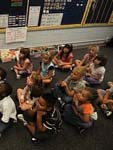







Introduction What About Freire? The Pink Monkey Psst! Wanna Buy A...? And His Pants Are Ugly Conclusions Opinions References and Credits |
In
Chapter 1, “Who Needs Teachers? The Generation After Liberatory
Pedagogy,” Ritter critiques the basis of one teaching method that has
attempted to address student alienation: liberatory, or critical,
pedagogy as embodied in the work of Paulo
Freire. Ritter’s critique of liberatory
pedagogy is based not on Freire’s work itself but on its validity as a
way of engaging and liberating American undergraduates who already have
access to computer technology and the ability to use that technology
for their own ends. The efficacy of Freire’s pedagogy relies
heavily not only on the Brazilian political and socioeconomic roots
from which it came but also, Ritter points out, on the authority of the
teacher in that
context. For it to “work”—in other words, for students to learn
to think for themselves—said students must first submit to the
teacher’s greater knowledge and
authority. This is why, as Ritter suggests, “the core goals of
liberatory
pedagogy” in the contemporary United States “have not been as fully
realized as its supporters may imagine” (p. 15). Online
technologies, she claims, and students’ extensive use of those
technologies, are reflective of students’ desire “to be independent
learners and thinkers, as defined on their own terms, rather than those
of the institution” (p. 16). In other words, many twenty-first
century American students are already liberated, though not necessarily
in ways early advocates of liberatory pedagogy would have
envisioned—because liberatory pedagogy, like it or not, still exists
within the institution. And for many contemporary practitioners
of that pedagogical method, e.g., Patricia Bizzell and James Berlin,
the teacher within that institution is in fact central to the method’s
efficacy. |